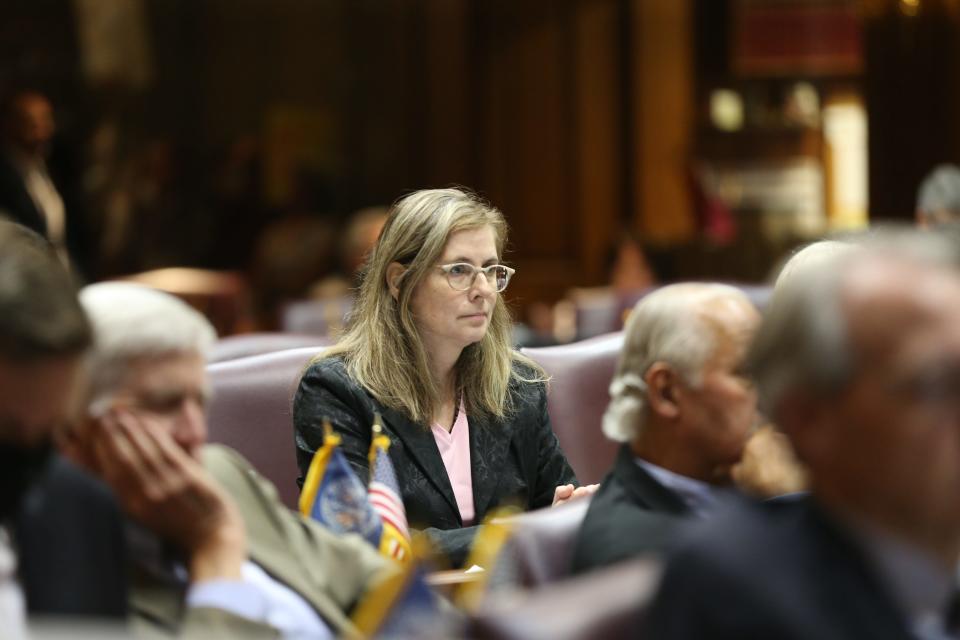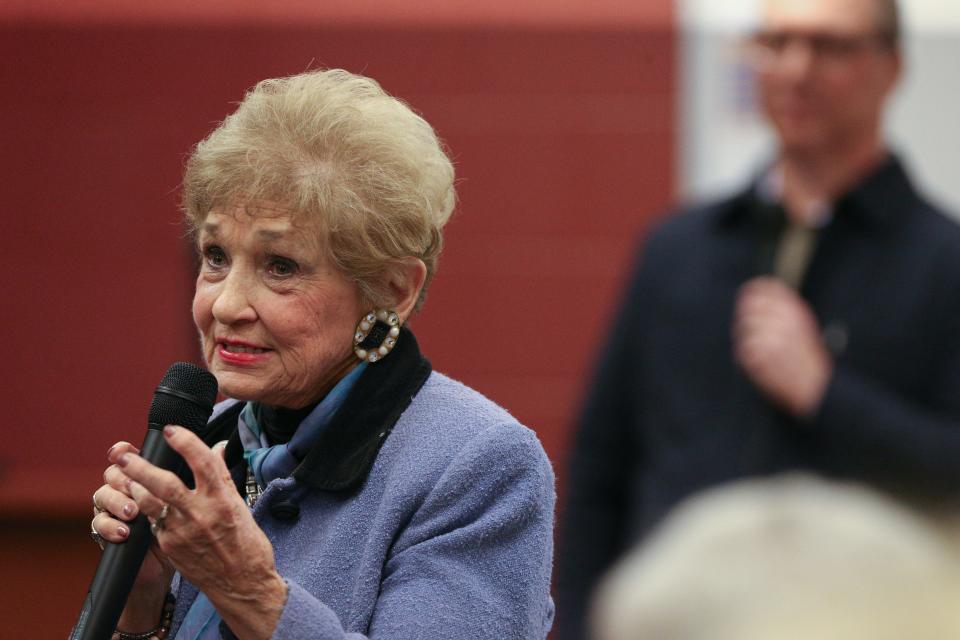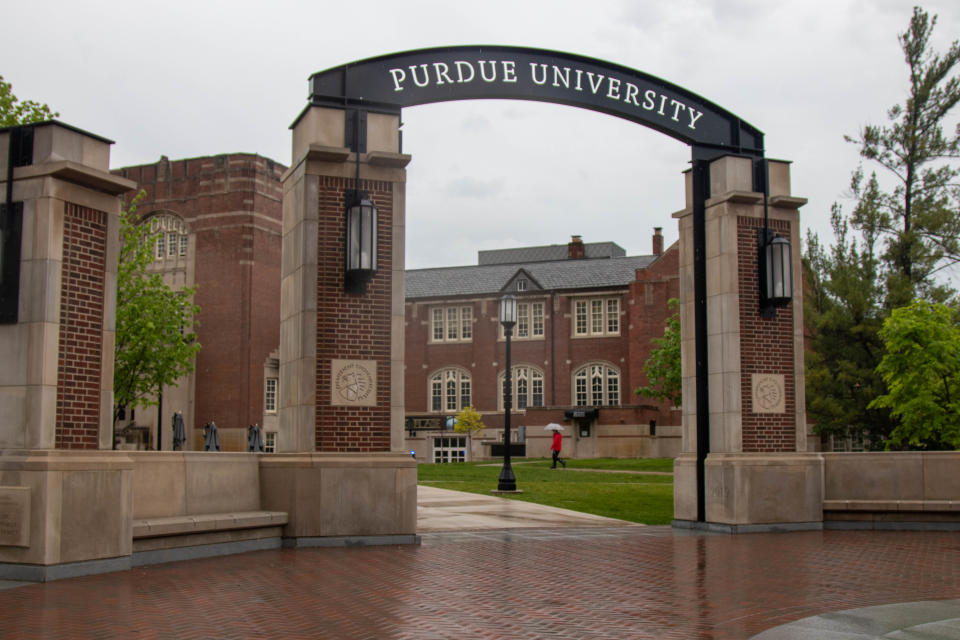Indiana tenure reform bill, Senate Bill 202, passes state House
- Oops!Something went wrong.Please try again later.
WEST LAFAYETTE, Ind. — Over the last month, opposition to Senate Bill 202 has steadily grown as many academics spoke out against the controversial education bill. Ultimately, those concerns fell on deaf ears as the legislation passed the Indiana House of Representatives Tuesday.
The bill now returns to the Indiana Senate. The last stop is the governor’s office, if the Senate approves changes made in the House.
The bill passed along party lines with 67 in favor, and 30 opposed.
SB 202, which was introduced by Sen. Spencer Deery (R-Lafayette), would reform the tenure process in Indiana to ensure public universities adopt a philosophy of promoting free speech and “intellectual diversity,” which was defined as “multiple, divergent and varied scholarly perspectives on an extensive range of public policy issues.”
The bill gives universities’ boards of trustees the ability to evaluate faculty members' effectiveness at fostering an environment for “free inquiry, free expression, and intellectual diversity.”
Boards of trustees will be able to define what intellectual diversity means at their campus, as well as within individual disciplines. The bill also directs universities to create a procedure allowing both students and employees to submit complaints against a faculty member or person who they believe isn't meeting the college's standard for intellectual diversity.
It will give the board the ability to determine whether faculty are eligible for tenure or promotion depending on their performance in promoting intellectual diversity every five years.
Representatives speak against the bill
Representatives spoke for an hour as they urged their colleagues to vote against Deery’s bill.
Notably, two representatives from Deery’s shared district, Rep. Chris Campbell (D-West Lafayette) and Rep. Sheila Klinker (D-Lafayette) spoke against the bill.
Campbell highlighted language in the bill which she found concerning, specifically the use of “unlikely” and “likely,” when determining if a faculty member meets the standard set by the board of trustees.
“… likely, while performing teaching duties within the scope of the faculty member's employment, to subject students to political or ideological views and opinions that are unrelated to the faculty member's academic discipline or assigned course of instruction,” reads the portion of the bill that Campbell referred to during the hearing.
“That begins likely. Are we now allowed to legislate thought crimes? This bill requires it,” Campbell said.

“They will have the authority to terminate tenured faculty based on whether or not they are 'likely' while performing teaching duties within the scopes of the faculty member employment to subject students to promoting intellectual diversity.
“Not, whether or not they’ve done it, but whether or not they’re likely to do it.
“That isn’t how we judge people in this country, or fire people, on what they are 'likely' to do.”
Campbell urged her colleagues to vote against this bill due to the vague language.
Shortly after Campbell spoke, Klinker urged her colleagues to be aware of the long-term consequences the bill may have on faculty across the state.

“I think we have to be very cognizant that this is stirring up a lot of controversy, a lot of negative criticism about what we're doing and why we’re doing it,” Klinker said.
“I think this bill is probably going to pass, but I would ask all of us to watch what is happening at our universities. We don’t want to lose our good faculty and we want to encourage our young people who are very talented to still come to our universities.
“We do not want a deterrent, which in many ways has been said about this bill. I would ask us after this bill passes, if it does, that we look very carefully at what is happening to our universities.”
Opposition from professors across Indiana
On Monday, four members of the American Association of University Professors, comprising faculty from Purdue University and Indiana University Indianapolis, went to the Statehouse to deliver a 672-page packet showcasing Indiana academics’ disapproval of SB 202.
The hope was Indiana’s representatives would respond to the collective disapproval from academics across the state.

“State universities like Purdue are economic engines of the state, providing a stable tax base for their communities, and contributing to strong K-12 school districts. Purdue is a top five university producer of patents in the country, and Purdue faculty are the ones that do the research that are awarded these patents. Patents become royalties, new products, start-up companies, and more investment in jobs in our community,” said Alice Pawley, a professor of engineering education at Purdue University, in a statement against SB 202.
“IU, too, provides over $3.5 billion in income to the state economy every year, and supports over 60,000 jobs. I don’t know why the state legislature would want to risk such economic success with an unproven and expensive government-driven process?”
The packet also contained over 500 letters from academics across the state and country calling for the Indiana House to vote "no" on this bill.
“This bill isn’t about protecting viewpoint diversity or it would have been written better, and the Republican Caucus would have listened to the concerns of their colleagues across the aisle, not trying to have the government solve a problem that does not really exist,” said David Nalbone, a professor of psychology at Purdue-Northwest and chair of the Purdue-Northwest Faculty Senate, in a statement against SB 202.
“Instead, this is government inserting itself where it isn’t needed.”
Noe Padilla is a reporter for the Journal & Courier. Email him at Npadilla@jconline.com and follow him on X at 1NoePadilla.
This article originally appeared on Lafayette Journal & Courier: Indiana's tenure reform bill Senate Bill 202 passes House

